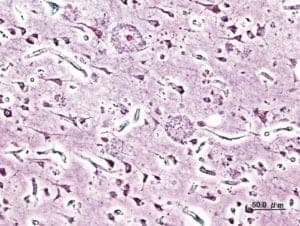Researchers are now working with immunotherapy to determine its role in the fight against Alzheimer’s disease.
The Alzheimer’s Disease Research Center at Mayo Clinic has begun clinical trials for a new type of drug that could possibly prevent an onset of the disease. Ronald Petersen, director of the research center, said immunotherapy is a field of medicine that’s growing. “I think the approach using immunotherapy is very popular right now,” he said. “So, by this, we mean that we are giving antibodies to individuals.”

The antibodies are given to patients in order to prevent any possible degeneration within the brain. The antibodies work by tackling excess proteins in the brain before any nerve cells are killed, said David Knopman, researcher and behavioral neurologist.
Almost two dozen clinical trials are being conducted at the Mayo Clinic. The trial designed to combat the onset of Alzheimer’s is known as the A4 Study.
“The A4 trial was conceived as a way to try to prevent the cognitive impairment of Alzheimer’s disease from occurring in the first place,” Knopman said.
Related: Promising Alzheimer’s Vaccine Moves Closer to Human Trials
Tom Hines, a participant in the trials, tries to challenge his brain by reading and working part-time in accounting. Hines volunteered for the trial for personal reasons.
“I don’t want to die the way my mother did. It was pretty sad,” Hines sad. “You must be asymptomatic for Alzheimer’s to qualify for the study. So, I ain’t got it.”
Participants in the study are tested for elevated levels of beta amyloid plaque in the brain with positron emission tomography, or PET scan imaging. A dye helps researchers to see the deposits in the patients’ brains by glowing orange.

There’s a delay of about 15 to 20 years between when elevated levels of the plaque show up to when someone develops Alzheimer’s, Knopman said. Aware of the delay, researchers are trying to treat those who are considered “clinically normal” with amyloid protein in the brain by removing the protein to hopefully prevent Alzheimer’s in the future, Petersen added.
Hines is just one of 1,100 participants who have volunteered for the trial. He will receive an IV each month for three years as part of his treatment.
“Half the people are getting the solanezumab – the active therapy – and half are getting a placebo,” Knopman said.
Related: Cholesterol Drugs May Lower Alzheimer’s Risk, Says Study
Solanezumab is the name of the antibody researchers are using with hopes to interrupt or even reverse the protein formulation within the brain. While the antibody was unsuccessful at removing an effective amount of protein in a separate study with patients with more advanced disease, researchers remain hopeful.
“There’s a strong scientific rationale for doing this study, and it’s different. It’s fundamentally different than treating people who already have established Alzheimer’s disease dementia,” Knopman said.
The A4 study is still accepting participants who are 65 to 85 years of age who have normal thinking and memory abilities. In order to participate, individuals must be willing to have a study partner, to receive IV infusions, and to have his/her health monitored with testing.
The study is for older individuals who are at risk for Alzheimer’s disease. It’s not for those who receive medications for Alzheimer’s disease, are diagnosed with a current or serious illness, or live in a nursing facility. For more information, visit a4study.org.
Tori Linville is a freelance writer and editor from Clarksville, Tennessee. When she isn’t writing or teaching, she’s faithfully watching her alma mater, the University of Alabama, dominate the football field.


![How To: ‘Fix’ Crepey Skin [Watch]](https://cdn.vitalupdates.com/wp-content/uploads/2017/05/bhmdad.png)












